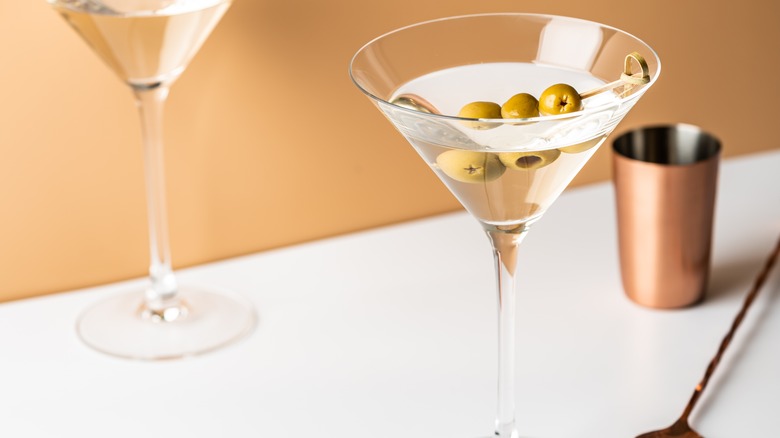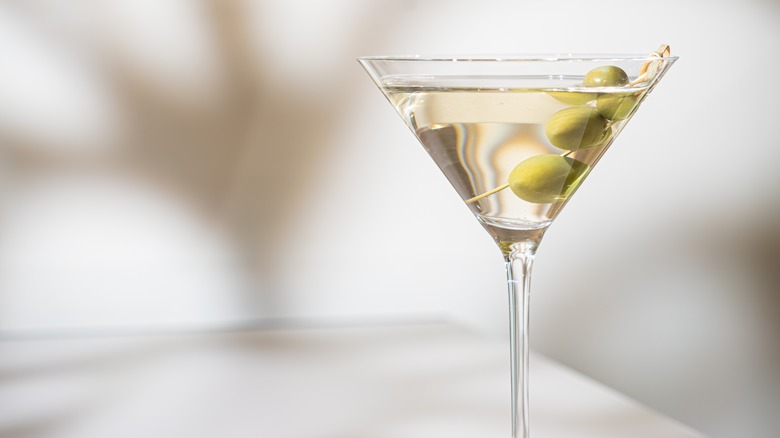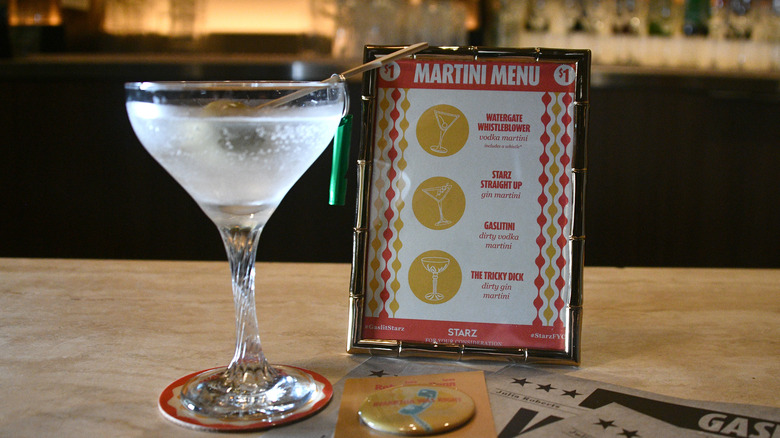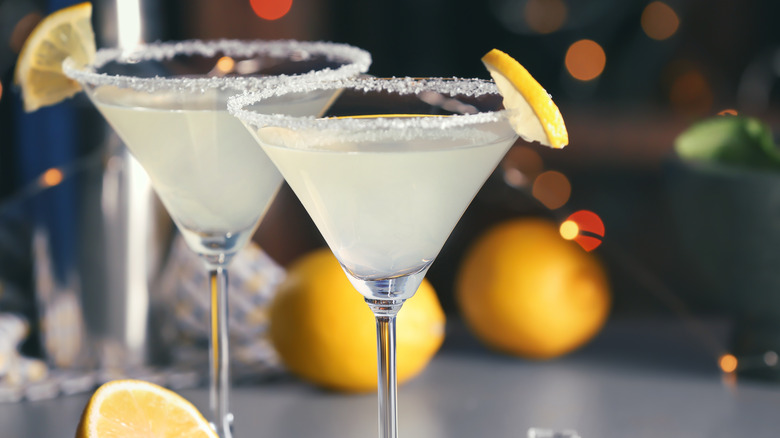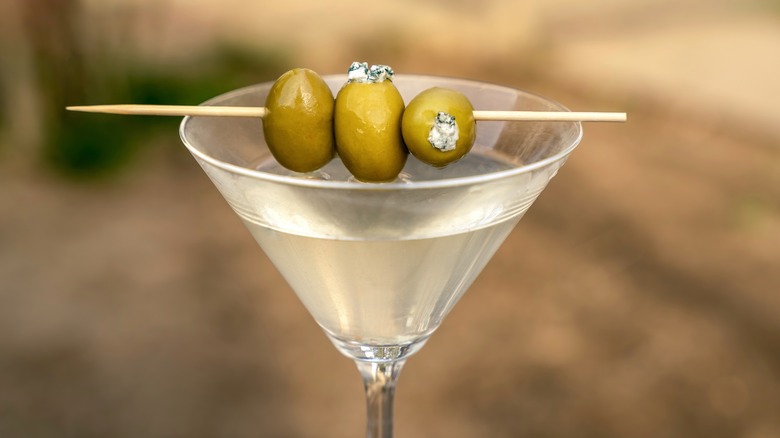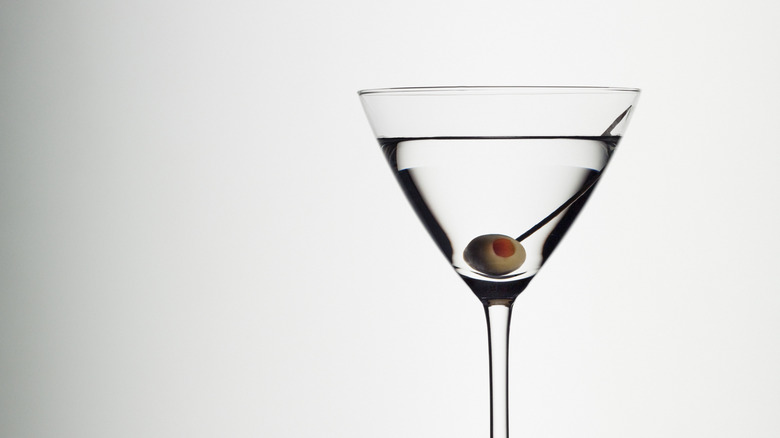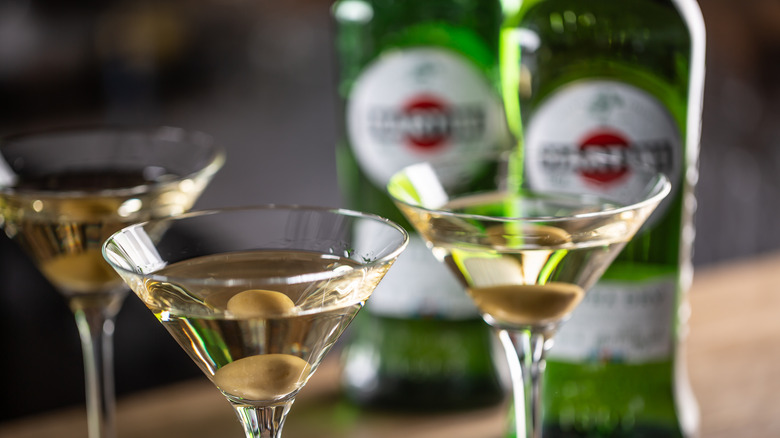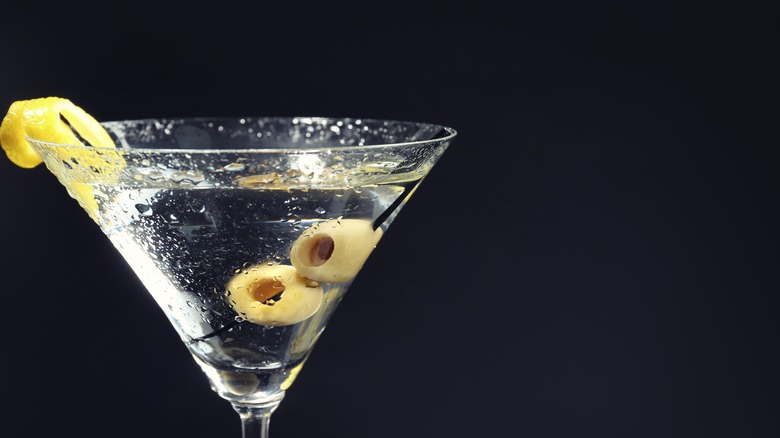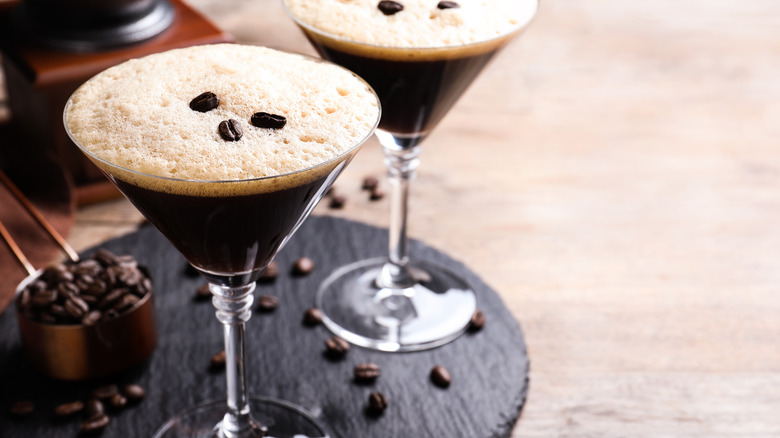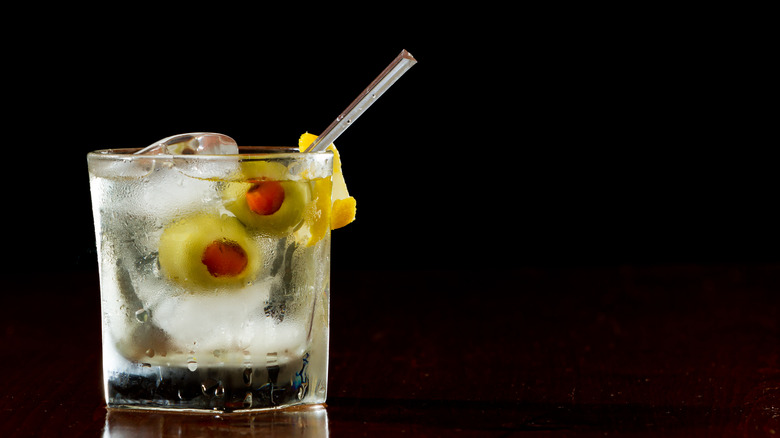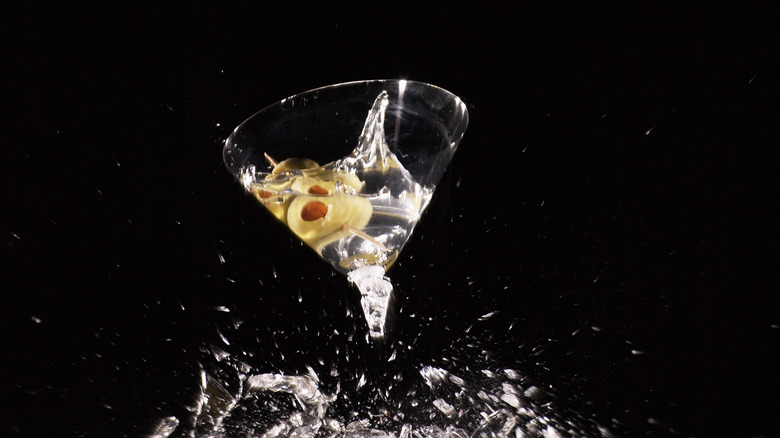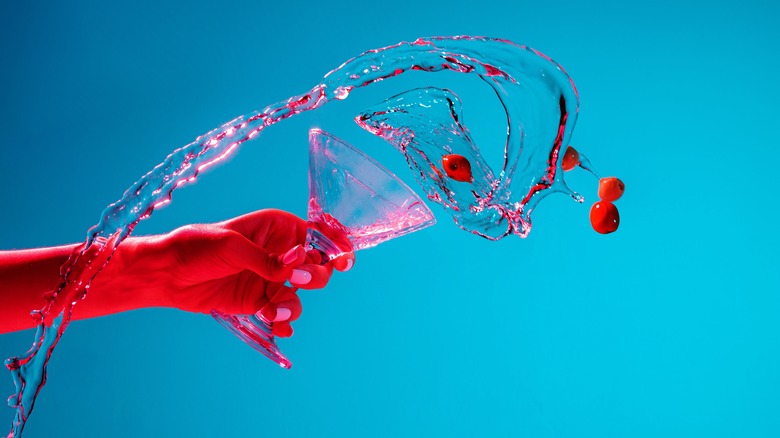The 15 Dos And Don'ts Of Ordering A Martini
If the idea of walking up to a bar and asking for a martini sends chills down your spine (or really makes you need a stiff drink), don't worry — you're not alone! Rather than shying away from this classic cocktail in favor of an easier-to-select beverage, we encourage you to do your homework so you can order a martini like a pro.
Martinis are one of the most customizable cocktails out there, and they're built on an interchangeable template more so than a straightforward recipe. Unlike ordering something like, say, a cosmo, which requires very little additional information, when you order a martini there are a few key things you need to make the bartender aware of to help them to make your drink.
While it's crucial to know what you should ask for the next time you want to enjoy this boozy libation, it's equally important to understand a few things to avoid. Read on to learn the dos and don'ts of ordering a martini.
Do: Understand the basics of the cocktail
If you think a martini is a fruity, light, easy-drinking cocktail, your order is pretty much doomed from the start. Knowing what you're getting yourself into is the first thing you need to do in order to ensure you end up with a beverage you actually enjoy. When it comes to cocktails, a martini is about as boozy as it gets, so if you're not a fan of spirit-forward drinks, this may not be the cocktail for you.
Most martinis are built with just two or three ingredients: a base spirit of gin or vodka, dry vermouth, and sometimes olive brine. Occasionally, a martini will contain just the base spirit (more on that later). If you don't think a sole measure of gin or vodka is enough to constitute a cocktail, we hear you. However, what differentiates a martini from a shot of straight booze are things like temperature, garnishes, and even glassware.
Don't: Just say you want a martini
Stating that you want "a martini" without any further clarification is pretty much a shot in the dark — and not in a good way. One bartender may default to a dry vodka martini, while another might go the gin route and choose a bottle that doesn't mesh with your preferred flavor profile. It just isn't enough information unless all you care about is getting cold booze in a glass.
Most bartenders will ask for your preferences if they can, but when it isn't possible for them to follow up (for example, if you have a friend order you a drink on your behalf), they're forced to guess. This is a lose-lose situation because if they make the wrong pick, everyone will be unhappy when the drink isn't right and has to be re-made. The bar itself loses here too, since dumping a perfectly good martini down the drain is equivalent to throwing away money.
Do: Know if you prefer gin or vodka
If you don't acknowledge a single other tip we suggest, just remember that when you order a martini, you're going to need to specify if you'd like gin or vodka to serve as the base of your beverage. There really is no "standard" here, so if you don't state your preference when you order, the bartender or server will most likely inquire. Of course, it's no big deal if they have to ask you, but if you don't think about it beforehand, this question can certainly catch you off guard. Just be aware that you'll have to make the choice, and keep in mind that one isn't necessarily better than the other.
Some people love complex gin martinis because they enjoy flavorful botanicals, while others are fans of the crisp, clean, relatively neutral taste of vodka. Pick whichever one you're in the mood for and get in the habit of requesting a gin martini or a vodka martini right off the bat.
Don't: Expect a martini variation unless you request one
We've mentioned it before, and we'll mention it again — bartenders can't read your mind. This bears repeating because there's such a vast difference between a classic martini (whether it's dry, dirty, etc.) and a sugary variation on the cocktail that they should be conceptualized as totally different drinks.
So, if you want a lemon drop martini, appletini, espresso martini, or really any beverage that has the word "martini" in it, you need to make that abundantly clear when you order. We can assure you that if you're after a fruity, sweet beverage (nothing wrong with that!), and you receive a dry vodka martini with olives, you're not going to be very happy. Do yourself a favor and stop this uncomfortable situation before it starts. Spending some time conducting a little beverage-related research can help you grasp the basic ideas behind various drinks (and it's a fun homework assignment if you ask us).
Do: specify if you'd like it dirty
Let's start with the basics: A dirty martini is a martini that's made with the addition of olive brine. The result is a beverage that's salty, savory, and (in some people's opinions) more palatable than a classic martini since the brine masks the burn of the booze. However, martinis don't come dirty unless you request them that way, and many (if not most) bartenders won't ask — which means you need to tell them.
Some people wrongly assume that if they request their martini to come with olives, it will automatically be dirty. This isn't the case, so when you just ask for a martini with olives, don't expect the bartender to add olive brine unless you specify.
It's also important to make it clear how much brine you'd like in your cocktail. If you just want a hint of salinity, ask for a slightly dirty martini. If you want to taste the brine more than the liquor itself, you can request extra dirty or even filthy.
Don't: Ask for an extra strong martini
Martinis are already inherently potent, so asking for an extra strong martini is duplicative and unnecessary. It's also annoying since bars don't just give out extra liquor without charging for it. You can order a double vodka soda, but it's not standard to order a double vodka martini. We don't make the rules, but we can tell you that it just doesn't work that way.
Similarly, you can ask for certain cocktails with an extra shot of liquor, but since the only thing that separates a martini from a straight shot is a little vermouth and/or olive brine, you really can't do anything to make them stronger aside from ordering another one. If you ask for an extra strong martini, the bartender will likely just internally roll their eyes and make you a standard one, since it's going to taste strong anyways.
So, if it's been an especially brutal day or you really want to let loose, just order martini number two and appreciate it in all of its balanced and measured glory.
Do: Order responsibly
We're not going to beat around the bush with this one. Martinis are strong. Even if you think you can handle your liquor, absolutely no one should be tossing back martini after martini without recognizing the sheer amount of alcohol these cocktails contain. People get themselves into trouble because while martinis are essentially all booze, well-made martinis are deceptively enjoyable, which makes it easy to slurp down too many.
Martinis don't contain that much volume, either. This makes it easy to polish off a martini and order another one while you wait for your friend to finish their (much more voluminous) gin and tonic. We recommend erring on the side of caution, especially if you're used to drinking lighter beverages. We promise you'll thank us when you don't wake up with a raging, martini-fueled hangover. At the end of the day, no matter how you order your martini, staying safe is the ultimate "do" when it comes to drinking!
Do: Let the bartender know your vermouth preferences
Another essential concept to grasp when it comes to ordering a martini is that vermouth is important. This rings equally true whether you like a martini that contains equal parts vermouth and spirit (remember: gin or vodka), or no vermouth at all — and you need to let the bartender know where you fall on this spectrum.
There's a lot of jargon involved when you order a martini, and requesting "dry," "extra dry," or "wet" does more than just make you sound like a cocktail-drinking expert. In fact, these key terms allow you to communicate exactly how much vermouth you want in your martini in two syllables or less.
Every bartender has their own recipe, but a standard martini usually contains about ½ ounce of vermouth, while a dry martini contains less. An extra dry martini typically means no vermouth at all (although some bartenders will rinse the glass with vermouth and then dump it out), while a wet martini contains more than the standard. However, if you sidle up to the bar and get confused, you can just tell the bartender straight-up (pun intended) what you want. Asking for light vermouth or heavy vermouth is pretty universal.
Do: Specify your garnish preference
Garnishes are more than just decorations when you're talking about a martini. Unlike some cocktails that feature one relatively universal garnish (for example, an orange twist in an old fashioned), martini garnishes are more of a "choose your own adventure" situation — which means you need to let the bartender know how you'd like them to finish off your drink.
Although there is a range of creative martini garnish options out there, the two most common options are olives or a lemon twist. The former adds salinity to the cocktail, while the latter adds brightness and acidity, so this is not an arbitrary or aesthetic choice whatsoever. If a pickled onion garnish is more your speed, then you're going to want to put in an order for a Gibson. Once again, a good bartender will most likely ask you if you forget to specify, but trust us when we tell you that there's a certain joy that comes from ordering a martini confidently and correctly, so you're better off just including your garnish preference off the bat.
Don't: Keep asking for extra olives
Don't get us wrong, asking for olives in your martini is a totally reasonable and respectable request. However, olives aren't free, and asking for six olives will put you on your bartender's bad side in a hurry. Despite their delicious snackability, olives are in fact, a garnish. They're not there to tide you over until dinner or prevent you from ordering a bar snack.
This recommendation really encapsulates one of the major don'ts for ordering drinks at a bar because it demonstrates the fact that guests assuming they can have things for free is generally frowned upon. While a few extra olives here and there might not seem like a big deal, bars operate on a large scale — so all those olives can add up to a significant decrease in profits if they're given away too frequently.
Besides, the allure of a few extra olives can be a great reason to order another round of martinis.
Do: Be polite
We hope that this is a totally unnecessary reminder and goes without mentioning that you should be polite and respectful when ordering anything from anyone. However, it bears repeating that bartenders are human, and even the most experienced pros often need to ask a few questions before they start crafting something as personal as a martini. Please don't be annoyed or embarrassed if you think you nailed the order and are met with a request for more information. We promise the bartender is just trying to do their job!
We'll also let you in on a little secret: Martini orders can be intimidating for bartenders as well as patrons. This is because with all the adjustments, customization, and generally strong options people tend to have about the cocktail, there's a better-than-average chance the guest won't like it and send it back, which comes at the chagrin (and financial detriment) of the entire establishment. So, please take this "do" as a friendly reminder to order your next martini with kindness, a smile, and an appropriate tip.
Don't: Expect every bar to be able to make specialty martinis
Just because the fancy cocktail bar you visited on vacation was able to make you a bespoke martini variation that you loved doesn't mean the dive bar down the street is going to be able to do the same. Not every bar is equipped to make even common martini variations, so we encourage you to consider your surroundings and manage your expectations when you order.
Not every bar brews the espresso that's needed to shake up an espresso martini; some don't stock apple liquor to make an appletini; and others don't even have sugar to rim the glass on a lemon drop. The best course of action here is to check the menu or ask the bartender if they can make the martini variation you're looking for — and to respond with understanding if the answer is no. It's also a good idea to have a backup at the ready just in case. You don't want to find yourself sidling up to the bar and then being caught off guard.
Do: Request up or on the rocks
This is a big one. Martinis can be served one of two ways: up, which means in a stemmed martini glass with no ice, or on the rocks, which means with ice. As you might imagine, the style you choose makes a big difference in your beverage so you need to include your preference as part of your order.
If you want the flavors of the base spirit and the vermouth to taste more pronounced, we recommend opting for a martini that's served up. The absence of ice prevents dilution, while the stemmed glass helps keep everything cold (since the heat from your hand won't be transferred to the cold part of the glass when you take a sip).
On the other hand, if you want a softer sipper, asking for your martini to be served on the rocks is a good bet. The ice adds just enough water to mellow out the flavors of the booze while still keeping things flavorful.
Don't: Complain that there's space in the glass
This one rings especially true if you like your martinis served up. If you've ever had the pleasure of enjoying a drink out of a stemmed martini glass, you've probably noticed that there's usually a noticeable gap between the rim of the glass and the surface of your beverage. Despite the all too common misconception that not pouring the drink to the top is a signal that the bar is being cheap, we're here to tell you that this space is completely intentional.
Martinis are not supposed to be overflowing out of the glass. It makes them impossible to carry without spilling, and you'd be surprised at how many ounces a seemingly small martini glass can hold. The bar isn't ripping you off by leaving space, they're actually helping you by ensuring your drink doesn't slosh out when you take a sip. Trust us, there's almost no better way to look like an amateur (and seriously irk the bartender) than by complaining that your drink isn't completely full.
Do: Explore different variations
Seemingly endless beverage possibilities aside, people get stuck in martini ruts — and we get it. Once you find a martini you love (and that you can order without missing a beat), it's easy to just stick with the same thing without considering other options. While there's absolutely nothing wrong with having a go-to martini order up your sleeve (in fact, we recommend it), switching up your order every now and again can result in finding a new favorite.
You don't have to go too far out of your comfort zone, either. Experimenting with an unfamiliar gin, asking for more vermouth than usual, or even just switching from up to on the rocks can make your martini feel more exciting. You can also ask for help if you're unsure how to take your beverage in a new direction on your own. Most bartenders will be more than happy to help guide you on your adventure.
